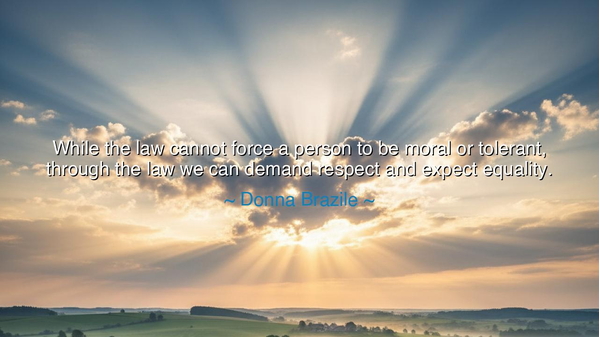
While the law cannot force a person to be moral or tolerant
While the law cannot force a person to be moral or tolerant, through the law we can demand respect and expect equality.






“While the law cannot force a person to be moral or tolerant, through the law we can demand respect and expect equality.” — Donna Brazile
In these profound and enduring words, Donna Brazile touches the eternal tension between the heart and the law, between what can be commanded by rule and what must be cultivated by conscience. Her wisdom reminds us that though morality and tolerance cannot be legislated into a human soul, the law still holds the sacred power to shape society’s boundaries — to establish what is right and just, even when the hearts of men falter. It is the law, not sentiment, that sets the floor beneath which dignity cannot be dragged. And in demanding respect through law, Brazile affirms that equality need not wait for the perfection of every heart; it must be guaranteed by the strength of justice itself.
The ancients, too, wrestled with this truth. The philosopher Aristotle once wrote that “law is reason free from passion,” yet the great lawgivers of history — from Hammurabi to Solon — knew that laws were not made merely to restrain evil, but to preserve harmony among flawed beings. The law cannot command love, but it can prohibit hate’s expression. It cannot implant virtue, but it can protect virtue’s victims. Brazile’s insight stands as a modern echo of this timeless understanding: that while the soul must choose goodness, the state must guarantee fairness.
Consider the struggle of the American Civil Rights Movement. For generations, morality failed where prejudice ruled the human heart. No sermon nor plea could sway the entrenched hatred of segregation. Yet when the Civil Rights Act of 1964 was passed, the law itself became a shield for the oppressed. It did not erase racism, but it drew a boundary against its power. It could not make men love one another, but it could forbid them from denying another’s humanity. Through law, the voiceless gained a voice, and equality ceased to be a dream of the righteous few — it became the expectation of a nation.
Brazile’s words arise from this lineage of struggle and triumph. As a daughter of the Deep South, she witnessed the gulf between human prejudice and divine principle. Her statement carries not cynicism, but hope — the belief that justice begins not in the perfection of human nature, but in the persistence of human systems. The law may not change a person’s heart, but by changing behavior, it can transform culture; and in time, culture can soften hearts. Thus, law and morality, though distinct, are forever intertwined in the slow evolution of human decency.
The ancients taught that order is the cradle of virtue. Without justice codified, morality collapses into chaos. To “demand respect and expect equality” through law is to insist that no one’s worth be left to the whims of another’s prejudice. Respect, when enforced by law, becomes the guardian of dignity. Equality, when guaranteed by law, becomes the soil in which tolerance can grow. The law does not ask us to love our neighbor — it compels us to treat our neighbor as equal before heaven and before man.
Yet, Brazile’s insight carries a warning as well: do not mistake legal equality for moral completion. The struggle does not end with the passing of laws; it merely begins there. The law can open the door, but hearts must choose to walk through it. A society that relies solely on legislation to enforce decency may preserve peace, but not compassion. The higher task, therefore, is to build upon justice with empathy, and to nourish equality with understanding.
Let this teaching be passed down as a torch for future generations: law is the skeleton of justice, but morality is its breath. Do not despair that laws cannot make men good — rejoice that they can keep the wicked from triumphing over the good. Defend laws that uphold dignity, and never tire of refining them, for through them, the world is taught to stand upright. But beyond that, strive also to awaken the heart — for though the law demands respect, only love can complete it. And when both justice and compassion walk together, humanity finally becomes worthy of the equality it proclaims.






AAdministratorAdministrator
Welcome, honored guests. Please leave a comment, we will respond soon